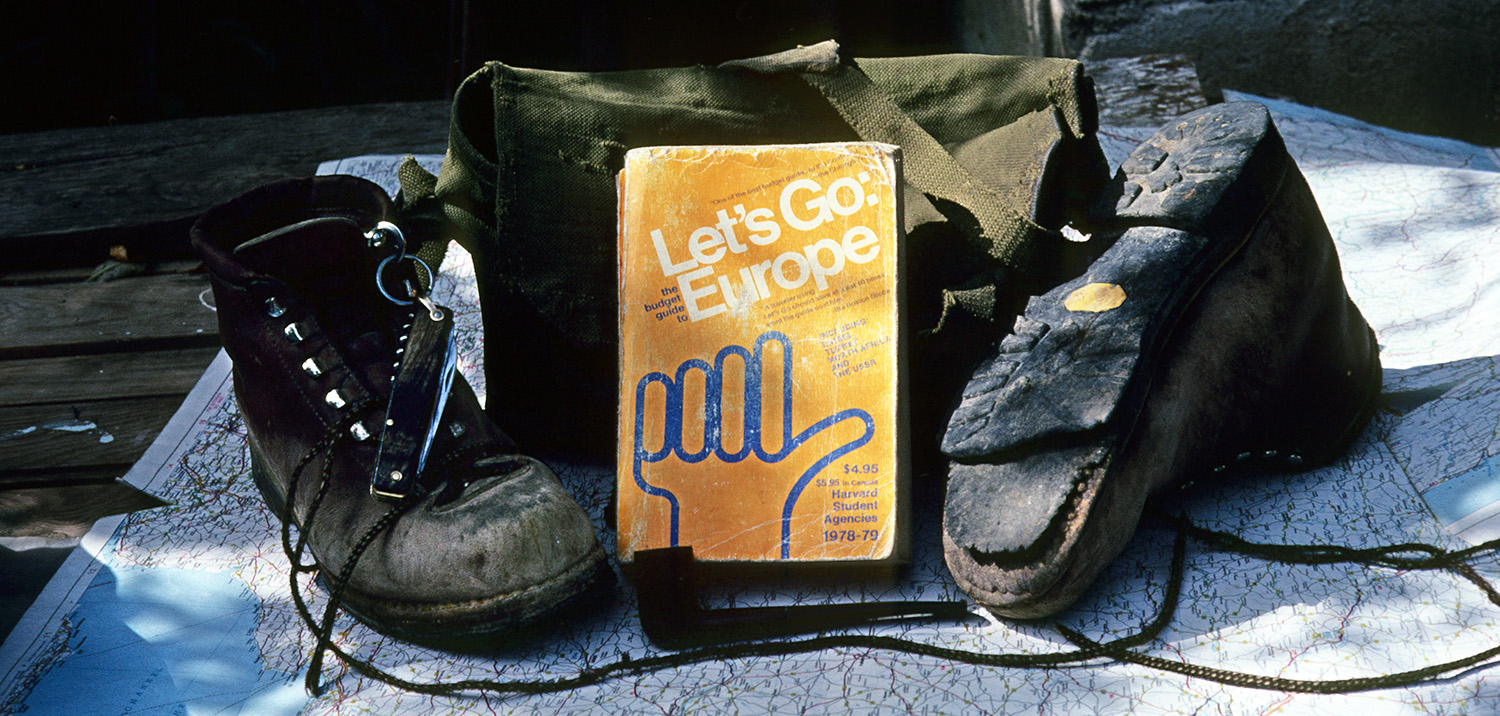Text and Photographs by Norbert Schiller
Forty-one years ago, I set out with a high school friend to travel around Europe and beyond. This is the last article in a five-part series that looks at my yearlong journey which would eventually determine my life as a photojournalist and adventurer. In this segment, I travel along the west coast of Turkey and spend time in Istanbul where I would eventually run out of money. After bartering a deal for room and board I continue on to Switzerland before finally making the journey back home. I made my debut in photography on this trip using an Olympus 35RD rangefinder camera with a 40mm f1.7 lens.

The Tholos of Delphi
From Crete I returned to Athens and then continued to the ancient site of Delphi on the slopes of Mount Parnassus, famous for being home to the oracle of the Greek god Apollo. My visit coincided with Orthodox Easter, a celebration that the Greeks take very seriously. On Easter Sunday I joined other people staying at my hostel on a walk to a nearby village to check out the festivities. Families were out in the central square roasting whole lambs on giant spits, and the smell permeating the air was making our stomachs rumble. Just as we were debating where to eat, a Greek American woman who was visiting her family asked us to join them for the Easter meal. We unanimously accepted and spent a wonderful time with our hosts eating lamb and drinking local wine.
At this point I was eager to visit Turkey but felt apprehensive after reading Midnight Express which tells the true story of Billy Hayes, a young American who was caught trying to smuggle hashish onto a plane at Istanbul airport. After he was convicted of drug smuggling, Hayes was thrown into a Turkish prison where the conditions were inhuman, but eventually managed to escape. The book was turned into a movie in 1978 and was still playing in the theaters in Athens a year later as relations between Athens and Ankara were at an all-time low and the Greeks wanted to portray Turkey as a barbaric country.
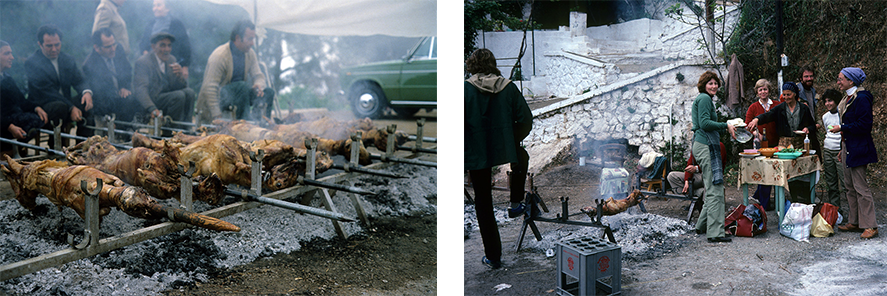
Village men roasting lamb on spits. Our group of travelers enjoying Easter lunch with a Greek American woman (center with apron) and her family.
My sense of adventure eventually outweighed my fear, so I boarded a ferry to the Greek island of Samos just off the Turkish coast from where I took another boat to Kusadasi, Turkey. As soon as I arrived at the bus station in Izmir, a young man came up to me and asked where I was from, When I told him, he said “do you know that two American soldiers with NATO were killed earlier today,” and then walked away (I was never able to confirm his allegation). I was still at the bus station deciding what to do when a disheveled German junkie looking for a travel partner picked me out of the crowd. After he found out that I was from the U.S., he volunteered to tell me that he had spent time with Billy Hayes in a Turkish prison. At that point, I just wanted out, so I jumped on the first bus going south. I ended up at sunset in the small coastal town of Didim where I found a café and settled down for a beer. There, I met two carpenters who invited me to stay with them at their job site. As one of them spoke German, we were able to communicate, and I found out that they were building a small hotel with plenty of space for me to stay.
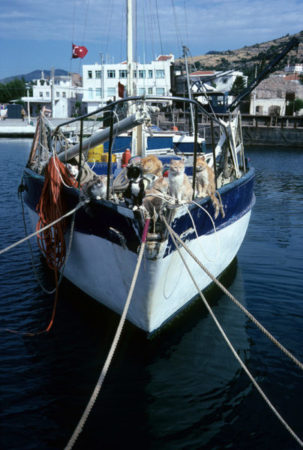
Tom’s cats greet me at the bow of the boat before jumping off.
From Didim I continued south to the port of Bodrum. When I look at pictures of Bodrum today, it looks unrecognizable compared to how I experienced it 41 years ago. Now one of Turkey’s mega tourism destinations, Bodrum back then was just a sleepy fishing port with a few cheap hotels and restaurants, and a seedy disco. A block inland from the harbor was a campsite in the middle of a lemon orchard. After setting up camp, I headed into town, but my gut feeling told me that it might be better to head to the bus station and continue my journey south. Luckily, I met a few foreigners who were spending the winter months there to work on their sailboats. As I stood there admiring one of those boats, the owner, Tom, asked if I could help him raise the mast, and I obliged. Tom was sailing around the world on a 43-foot boat, but what made his story special was that he had 8 cats aboard keeping him company on his journey. The herd was locked in the cabin and I only got to meet them when Tom invited me in for lunch. They made it clear that I was invading their space and as soon as there was food on the table one of the felines jumped up and served herself.
Tom invited me again for dinner after I had helped him on the boat for a second consecutive day. When I arrived at sunset, all but one of his cats were on the bow looking like a greeting committee. To avoid disturbing my host, I decided to jump aboard by pulling the rope attached to the boat closer to the dock. When Tom realized what I was doing, he yelled out from inside the cabin for me to stop, but it was too late. All seven cats had jumped off the boat onto the dock giving me, Tom, and some local fishermen the run of our lives as we raced around the harbor trying to catch them. I went on to publish my first magazine story in Cat Fancy about my encounter with Tom and his cats.

Miss Puss Puss, jumping from one boat to another, eluded capture until all the other cats were caught. All of Tom’s cats wear the harness seen in this picture when they are out at sea to prevent them from falling overboard.
From Bodrum I continued along the coastline, mostly by bus, but also hitchhiking whenever possible. My first stop was Marmaris, followed by Fathiye, then Antalya, and finally the little seaside resort town of Sidi. Since I was running out of funds, I resorted to sleeping in hotels under construction. As soon as the workers left at the end of the day, I would sneak inside and sleep on the roof or in one of the unfinished rooms. The exception was Sidi, where I was invited to sleep in a private yard with an outdoor shower right by the sea. I camped there for a few days exploring Roman ruins by day and going out at night with some Turkish students camped near me, for food, beer, and to watch soccer games on TV.

The old quarter of Marmaris that hugs the shoreline. The Lycian rock tombs, dating from the 4th century B.C., carved into the cliffs above the town of Fathiye in southern Turkey.
From Sidi, I took the all-night bus to Istanbul where I found a cheap hotel and a Turkish bath. I can’t remember the last time I had felt so clean. The political situation in Istanbul was tense with soldiers patrolling the streets and setting up checkpoints at major intersections. Turkey was in the midst of an economic and financial crisis, but, instead of trying to resolve the issues, the country’s political parties bickered and fought each other. During my stay, the military only made threatening gestures, but when the situation turned to the worst the following year, the army took over.
In spite of the tension, I immediately felt at home in Istanbul and for the first week I roamed the city and its covered bazaar hanging out with shop owners. I hadn’t bought a single souvenir during my entire nine-month trip but, with so many beautiful things in the shops, I felt the urge to make a purchase. The first thing I bought was a silver bracelet that I negotiated down from 1000 to 600 lire (USD 28 to 13). The process took about a week by the end of which the shop owner and I had become good acquaintances. My second purchase was a chillum pipe made of white Meeschaum stone used to smoke hashish. I also wanted a small carpet, but the store owner only agreed to give it to me for free if I could find another buyer. However, most hostel residents were only interested in buying trinkets, so I took them to the shopkeepers I had got to know in exchange for a small commission. Unfortunately, no one could afford a carpet.
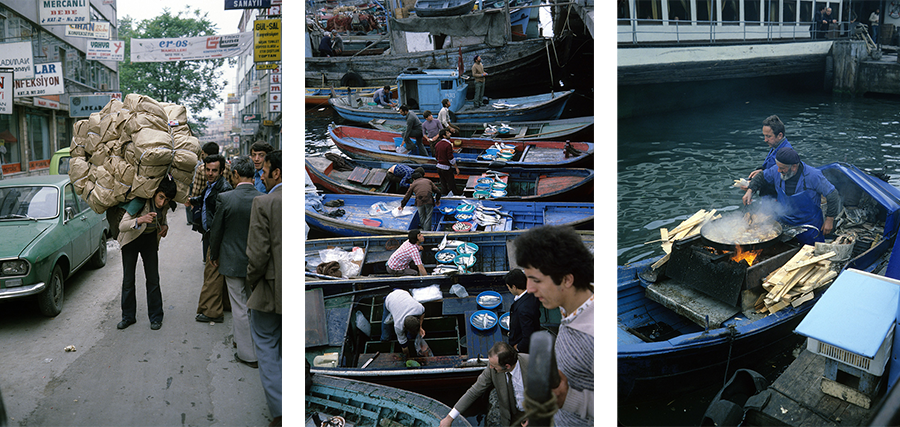
A man about my age carrying heavy loads for a living. Fishermen on boats selling their daily catch. Two men below the Galata bridge selling fish sandwiches from a small boat.
In the evenings I would inevitably end up at the Pudding Shop, a favorite hangout for hippies and travelers during the 1960s and 1970s. The place served food and alcohol, but also Sutlac, a milk-rice pudding which is gave the restaurant its name. More importantly, the Pudding Shop served as a gathering place for those looking for a ride or travel partner to journey further east along the “hippie trail” that ran through Iran, Afghanistan, Pakistan, and on to India and Nepal. There was also a messaging board, the only one in Istanbul, where people left various notes to friends or advertised items they were looking to unload.
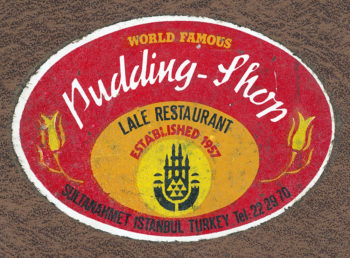
The Pudding Shop sticker glued to my diary
In 2001, I went back to the Pudding Shop for the first time since my 1979 visit and met the owner, Adem, whose father had founded the restaurant along with his brother in 1957. I vaguely remembered Adem because back in the day he used to play music every evening. Together, we reminisced about the old days and how things had changed. Except for the paraphernalia from the old days and some press clippings about the joint which were featured on the walls inside, the Pudding Shop had changed beyond precognition. The façade had been torn down and in its place was an open seating area that extended onto the sidewalk. Beside the physical transformation, the restaurant now catered to package tourists.
After a week in Istanbul I realized that I only had about 40 dollars to my name which wasn’t enough to buy a bus ticket to Germany and a transit visa for Bulgaria. With no other option left, I decided to plead my case with the bus company. However, since the bus wasn’t scheduled to leave for a few days, I still had an accommodation problem. After learning about my plight, the bus company director, who also owned a few hostels in town, agreed to sell me a bus ticket with the money I had, and offered me room and board on condition that I bring clients to the hostels every day. Every morning, I ran down to the bus station to catch young travelers as they got off one of the overnight buses to ask them if they needed a place to stay. Because they identified with me, it was easy to gain their trust, and, as a result, I was able to fill my quota until I left for Germany.
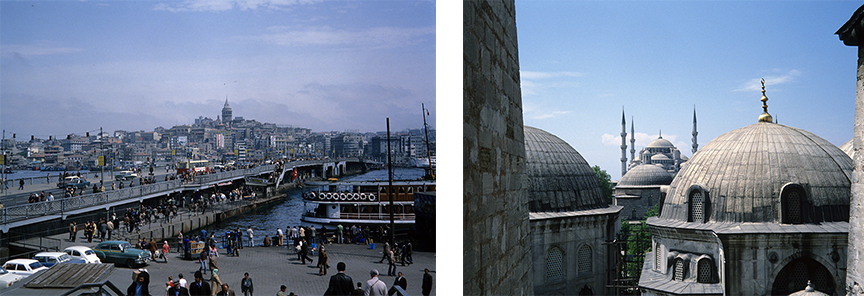
A view of the Galata bridge with the Galata Tower in the background. The Suleymaniye Mosque
The bus to Munich was full of Turks, Afghans, Indians, and Iranians. The only non-Asians were myself, an elderly German man, and Andreas, another young traveler from Switzerland with whom I immediately bonded. When we stopped at the Turkey-Bulgaria border, Andrea stepped out of the bus and disappeared to smoke hashish. At the next crossing between Bulgaria and Yugoslavia, both Andrea and I jumped off for a smoke. What’s ironic is that as authorities spent hours searching the bus for drugs, there we were a few meters away, smoking the illicit weed. When we reached the Austrian border, the authorities pulled the bus into a confined area, and asked all passengers to bring out their bags and dump the contents on the grass. At that point, Andreas took the chunk of hash he was carrying, broke off two pieces for each of us to swallow, and threw the rest over the fence. After two days on the road without food, Andrea and I began suffering from hunger pains. Since neither of us had any money, a fellow Turkish traveler took pity on us and bought us breakfast at one of the roadside stops.
When we arrived at the German frontier, the border police refused to let the bus in, so we were forced to continue to Munich by rail, but the trip was covered by the bus company. Since both Andreas and I were headed for Switzerland, we hitchhiked together the rest of the way. When I arrived in Zurich, my first destination was the bank to withdraw the 1000 Swiss Francs that my father had left for me in his account. After nearly four days of traveling by bus, train, and hitch hiking, I must have looked crazed when I stepped into the bank carrying a backpack. Surprisingly, I had no problem taking out the money which would be a tough sell these days.

The magical beauty of Switzerland
In Bern, the capital of Switzerland, I was invited to stay with Lotti one of my father’s old girlfriends. But as she wasn’t home when I arrived, I spent the day roaming the old city. If Istanbul’s covered bazaar was a treat for exotic trinkets, Bern was a feast for window displays of gourmet food. After living on a shoestring budget for nearly a year, I finally had enough money in my pocket to buy whatever I felt like eating. I walked into one shop and ordered a chocolate mousse, then in the next shop I bought a ham and cheese sandwich followed by ice cream, and finally I sat in a café and ordered a beer.
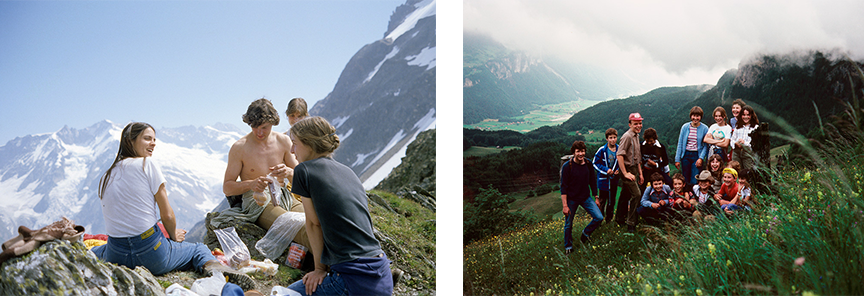
Hiking in the Alps with my former babysitter Georgia (wearing a white shirt). Helping my friend Peter take his class for a walk in the wilderness above Meiringen.
One of the first things that Loti did after we met was take me to a barber for a haircut and beard trim and then we went shopping for new clothes and a pair of shoes. I suddenly felt gentrified after looking like Tom Hanks in Castaway for the past few months. After my stay with Loti, who introduced me to my father’s family and some of his close friends, I went to the village of Meiringen in the Alps to visit my babysitter Georgia, her Swiss husband Ernest, and their two children Daniel and Ruben. I had previously seen Georgia at the beginning of my trip at Chateau Brandeau in the southwest of France and was looking forward to spending more time with her and her family.

Rock climbing above Meiringen with Georgia’s 12-year old son Ruben who swore to his mother, “Mommy, I promise I won’t go rock climbing with Norby.”
Compared the places I had visited while traveling through Europe, North Africa and Turkey, Meiringen seemed like a breath of fresh air, much in line with its pristine Alpine setting. On the surface, everything was perfectly manicured and beautiful. Years later, I learned that appearances can be deceiving. Meiningen is near Interlachen, a beautiful tourist destination situated between the lakes of Thun and Brienz. Besides being a picture-postcard tourist town, Interlaken at one point had one of the highest heroin addiction rates in Europe, an affliction which spread over the entire valley including Meiningen. But during my visit, I was naïve and only saw the beauty and magic of this Alpine hideaway. I spent my time in Meiningen hiking in the Alps, rock climbing, swimming in the crystal-clear waters, and helping a friend who was a schoolteacher take his class on outings. I became so enamored by the lifestyle that I fantasied spending the rest of my life in this mountain paradise.

After nearly a year on the road it was time for me to return back to America.
Reality hit home when I found myself running out of money, yet again, and felt the urge to move on with my life. My father made it very clear that it was time to come home, get on with my studies, and figure what I want to do in life. So almost a year after I set out on my adventure, I was sitting at the train station in Bern saying a tearful farewell to family and friends who had hosted me for the past two months. My destination this time was London from where I had bought a one-way ticket back to Los Angeles.
